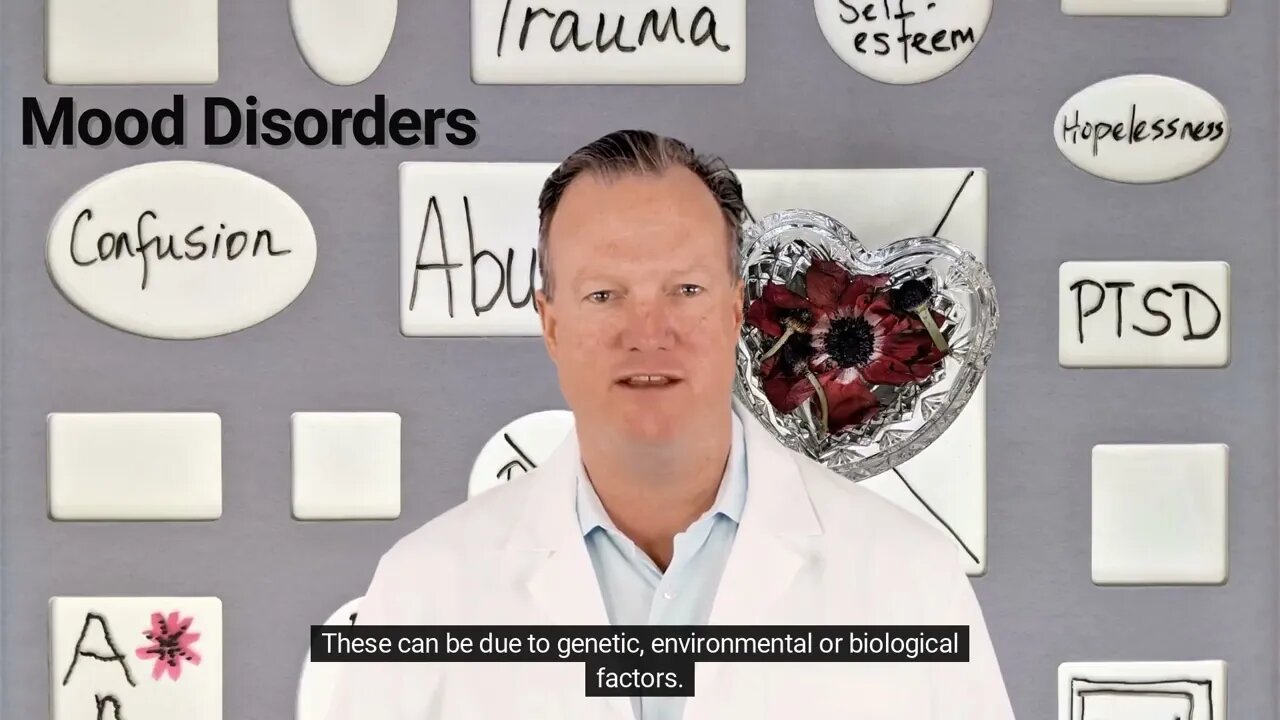Premium Only Content

What you should know about mood disorders
Work with a health coach on a monthly basis, and start improving your health from tomorrow. info@superlongevity.net Services of our professionals: health and longevity consultations, health and longevity research for private and business clients, helping you create a personalized protocol for your needs.
New email for contact: info@superlongevity.net Write us (info@superlongevity.net) to know how to purchase one or more of the new protocols offered by our professionals:
1) the super longevity protocol;
2) the super immunity protocol;
3) the super energy and mitochondria protocol;
4) the hair loss protocol:
5) rejuvenation T protocol (telomeres age);
6) rejuvenation M protocol (DNA methylation age);
7) sport performance, stamina and endurance protocol;
8) sport performance, testosterone, muscles and strength protocol.
For any other queries, feel free to write to info@superlongevity.net and we'll put you in touch with professionals who work with our network.
***
Mood Disorders
***
Tell us about your personal experience in the comment section.
We are always thrilled to hear your feedback and experience.
***
If you want us to give you the contact information of professionals who work with our network, feel free to write to info@superlongevity.net and we'll put you in touch with the right professional for your needs.
In order to better find the right professionals for you, please indicate in your email if your queries regarding: 1) overall health; 2) food and supplement; 3) longevity. 4) others (in this case a brief description of your needs is recommended). We will get back to you as soon as possible with the contact information of a specific provider.
***
Mood disorders refer to the mental health state of a person. It is a state where a patient of mood disorders feels either being sad or being happy over a long period of time. Mood disorders are related to one's feelings, emotional and behavioral approach towards the surrounding environment. There are many types of mood disorders such as major depression, mood disorders due to underlying disease conditions, bipolar disorders and disorders that are caused due to drug intoxication. Generally speaking mood disorders are divided into depression and bipolar disorders. Each subtype has different signs and symptoms. For example in depression, a person is sad, disappointed and gloomy. Whereas in bipolar disorders there are alternative conditions of mood being good sometimes and then being sad for another duration. In the same way substance abuse is also linked with the euphoria or happier mood. In substance abuse type disorders, a person feels more happy, talks too much, sleep less and easily gets distracted. Signs and symptoms of mood disorders can show up even without any visible reasons. Some people get in a bad mood because of hormonal changes, less sleep and other stressful environments. Being moody for a short period of time doesn't mean that you can be diagnosed with any mood disorder. But if signs and symptoms persist over a long period of time, a person can be declared a case of mood disorders. And these disorders if not treated early lead to serious outcomes for your mental health. Mood disorders are due to multifactorial agents. These can be due to genetic, environmental or biological factors. Risk factors that can cause depressive mood disorders are major traumatic events, family history of such illnesses, diabetes, cancer and stroke. Symptoms of major depression includes difficulty in focusing, suicidal thoughts, weight gain, feeling sad everytime, hopelessness and distrubed sleep wake cycle. Mood depressive phases are the same as that of depression. But in manic phase symptoms are totally different such as racing thoughts, sleeplessness, extremely energetic and agitation. Mood disorders are diagnosed by taking a detailed medical history, physical examination of psychological assessment of patients. A doctor may ask you some questions, conduct an interview or survey tMood disorders must be taken seriously. If left untreated it may be harmful. Mood disorders are treated with medicines and psychotherapy. Antidepressants, mood stabilizers and antipsychotics are few drug groups that are usually preferred. If medical therapy fails, psychological intervention in the form of combined behavioral therapy is required for treating such disorders.
We would like to hear about your own experience with this topic. Leave a comment. Lastly, remember that it is important to talk to your doctor or other professional before beginning any sort of supplementation or treatments. Feel free to contact us if you want us to give you the contact information of professionals who work with our network.
***
Topic related to: LONGEVITY, HEALTH, IMMUNITY, INFLAMMATION, ANTIAGING, LIFESPAN, Mitochondria, HEALING, SUPPLEMENTS, HEALTHY LIFE, IMMUNE SYSTEM, LONGEVITY PROTOCOL.
Contact: info@superlongevity.net
-
 0:15
0:15
Super Health and Longevity
1 year ago $0.01 earnedUncovering the Secret to Immortality A Subway CoFounders Quest
1071 -
 12:08
12:08
Zoufry
1 day agoThe Mystery of Gaddafi's Final 24 Hours
5.31K2 -
 18:25
18:25
Liberty Hangout
13 days agoAnti-Ice Demonstrators Love Poop!
18.6K46 -
 9:39
9:39
MattMorseTV
14 hours ago $0.89 earnedVance just DROPPED a BOMBSHELL.
30.5K62 -
 23:47
23:47
GritsGG
1 day agoThe Forgotten Best Sniper Support AR!
6.44K2 -
 1:15:48
1:15:48
The Pascal Show
16 hours ago $0.06 earnedMUGSHOTS RELEASED! Emmanuel Haro's Parents Mugshot Released To The Public
4.99K1 -
 14:45
14:45
BlabberingCollector
19 hours agoKings Cross Station SET LEAKS! | Harry Potter HBO Show Update & News
4.67K -
 33:20
33:20
SB Mowing
9 days agoHealth Struggles + Endless Rain = A Yard Out of Control
13.2K18 -
 1:09:42
1:09:42
Mike Rowe
4 days agoHow Did THIS Dirty Job Make Tommy Mello A Billionaire?! | #447 | The Way I Heard It
71.3K20 -
 10:11:30
10:11:30
SpartakusLIVE
11 hours agoThe BADDEST Duo in WZ Exhibits PEAK Physique || Duos w/ Sophiesnazz to start, quads later
170K1